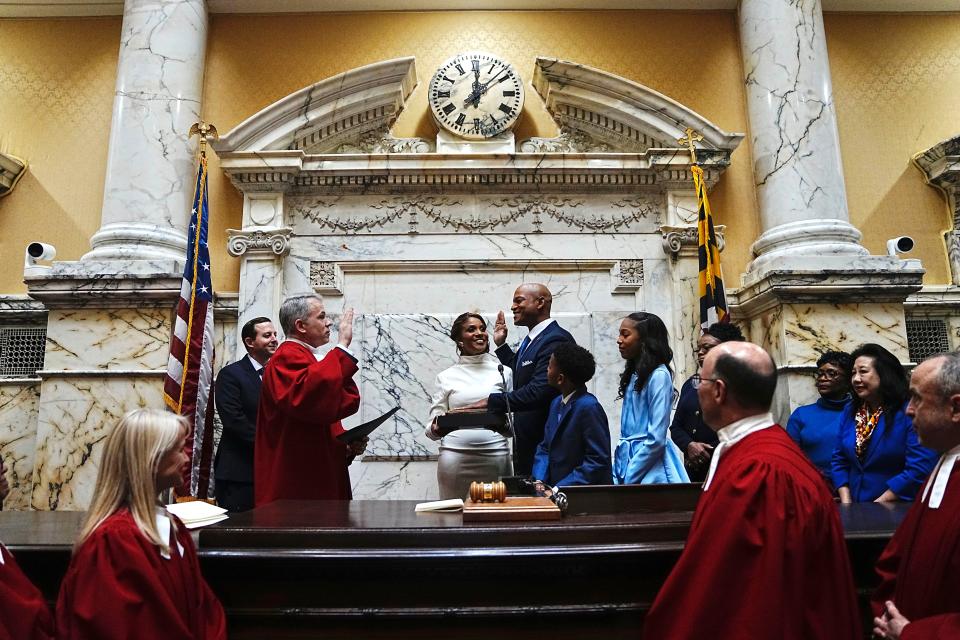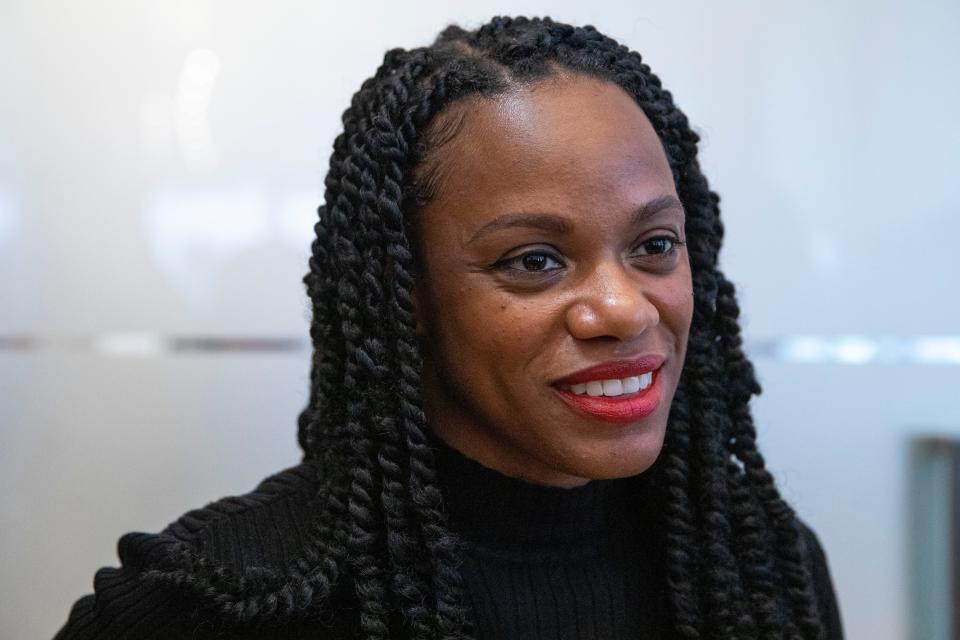At 11, in handcuffs. Now, Maryland's first Black governor: Wes Moore and lessons from being first
- Oops!Something went wrong.Please try again later.
Wes Moore’s campaign manager held up his hand, and the crowded room fell silent, waiting to hear the results of Maryland’s 2022 governor election. When Moore was announced as the winner, the room erupted. It was a life-changing moment for the 44-year-old, who had just become Maryland’s first Black governor and only the third elected Black governor in U.S. history.
As everyone was celebrating, Moore says he was soaking in the moment — and thinking about his grandmother.
Winell Thomas helped raise Moore after his father died when he was 3 years old. “She was born in Cuba, raised in Jamaica, and immigrated to this country,” says Moore, who shared that she passed away five days before the election. “If you had asked her when I was young if there was a chance this could have happened, she would have said yes.”
However, when Moore was young, he would not have had the same faith in his future.
Stay in the conversation on politics: Sign up for the OnPolitics newsletter
“At 11, I was in handcuffs, so no,” he says, recalling the day he was put into a squad car for tagging walls with graffiti. After being sent to military school at 13 by his mother, he put his life on track, graduating from Valley Forge Military College and Johns Hopkins University. As a teenager, he interned for then-Baltimore Mayor Kurt Schmoke. Moore went on to earn a Rhodes Scholarship, which led him to Oxford University in England.
“My mother and grandmother believed in me and sacrificed for me,” Moore says. “That election moment was a testament to that sacrifice.”
After delivering his acceptance speech, Moore reminded his children, 11-year-old Mia and 9-year-old James, of their place in the world.
“There’s an imposter syndrome with children of color where you’re waiting for someone to tap you on the shoulder and say, ‘Hey, how’d you get in here?’” Moore says. “I want every kid of color to know that they are never in a room because of someone’s benevolence, kindness or social experiment. They’re in that room because they belong there.”

And now Moore takes his own place in Maryland’s history.
“It’s humbling because this is the state of Harriet Tubman, Frederick Douglass and Thurgood Marshall,” he says. “It shows that progress requires work, but it is possible as long as we’re willing to grow together.”
Moore’s historic moment was one of several for candidates of color in the 2022 elections.
In Florida, Democrat Maxwell Alejandro Frost, a then-25-year-old Afro-Latino, became the first member of Generation Z in Congress. In Pennsylvania, Summer Lee won a House seat to be the state’s first Black congresswoman. Ilhan Omar, who won a third term from a district in Minneapolis, is the first woman of color to represent Minnesota in Congress and the first Somali-American in the House.

Voted into history: Wes Moore elected Maryland's first Black governor; Maxwell Frost brings Gen Z to House
When it comes to being a “first,” Moore remembers a lesson from his South Carolina-born grandfather, who as a child moved with his parents to Jamaica in the middle of the night after Moore’s great-grandfather received death threats from the Ku Klux Klan.
“He told me that being the first is humbling, but it’s not the assignment,” Moore says of James Thomas, who returned to the U.S. as an adult and became the first Black minister in the Dutch Reform Church. “The assignment is to make sure that you honor the reason why you are there in the first place.” For his own situation, Moore adds that it “is not to be the first Black governor (of Maryland). It is to address things like poverty and making our state more competitive.”
Today, Moore’s mission is found in a mantra he learned in the Army, which included a stint in Afghanistan. “Leave no one behind’ is really my value statement,” he says. “This state is going to move with urgency and take care of each other, leaving no one behind in the process. It’s how I live my life.”
Moore also understands that his new position will come with obstacles. “It comes with a sense of humility that there are a whole lot of people who didn’t support me,” he says. “The transition is, now that we’ve earned their trust, how do we make sure we keep it? There will be challenges, difficulties and disagreements.”
Moore’s early journey is documented in his 2010 book, "The Other Wes Moore: One Name, Two Fates."
Previously: Author Wes Moore wins Democratic race for Maryland governor
It’s a story of how another young Black man, also named Wes Moore, was one of four accused of killing a police officer in a botched armed robbery. At the time, the now-governor Moore was an undergraduate studying abroad in South Africa. He eventually started corresponding with the imprisoned Wes Moore. The New York Times bestseller documents their parallel lives growing up in inner-city Baltimore.
“The point was to show how thin that line is between our life and someone else’s life,” Moore explains. “So many children are in an environment where decisions are being made on their behalf before they even have a chance to make decisions for themselves. There are consequences to that. We have a collective responsibility to shape destinies and how those destinies will impact society.”
Midterm elections takeaways: Biden's agenda helped Dems, abortion concerns tipped scale
Gubernatorial firsts
Prior to Wes Moore being elected governor of Maryland, only five other African Americans had served as a state governor.
Only two others had been elected to the position:
L. Douglas Wilder of Virginia, elected in 1990.
Deval Patrick of Massachusetts, elected in 2007.
Three filled the office when an elected governor was unable to serve:
Oscar James Dunn of Louisiana, the first Black elected lieutenant governor, who served as acting governor in 1871.
P.B.S. Pinchback of Louisiana, from Dec. 9, 1872, to Jan. 13, 1873.
David Paterson of New York, from March 2008 to January 2011.
Senatorial firsts
In 1870, Hiram Rhodes Revels of Mississippi became the first Black senator. Five years later, Blanche Kelso Bruce of Mississippi took the oath of office. Nearly a century later in 1967, Edward William Brooke III of Massachusetts followed in their historic footsteps. Now we mark 30 years since Carol Moseley Braun broke ground in 1993 as the first Black woman to serve as a U.S. senator.
This article originally appeared on USA TODAY: Wes Moore: At 11, in handcuffs. Now, Maryland's first Black governor:

